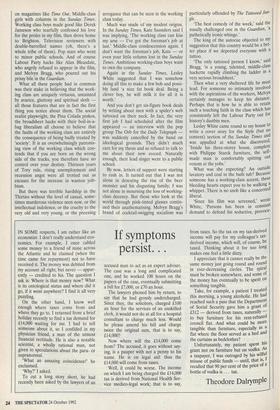If symptoms
persist. .
IN SOME respects, I am rather like an economist: I don't really understand eco- nomics. For example, I once cabled some money to a friend of mine across the Atlantic and he claimed (when the time came for repayment) not to have received it. The money was debited from my account all right, but never — appar- ently — credited to his. The question I ask is: Where is that money now? What is its ontological status and where did it go, if it went anywhere? I find it all very puzzling.
On the other hand, I know well enough where taxes come from and where they go to. I returned from a brief holiday recently to find a tax demand for £14,000 waiting for me. I had to tell someone about it, so I confided in my physician friend, a man of the utmost financial rectitude. He is also a notable scientist, a wholly rational man, not given to speculations about the para- or supranormal.
'What an amazing coincidence!' he exclaimed.
'Why?' I asked.
To cut a long story short, he had recently been asked by the lawyers of an accused man to act as an expert adviser. The case was a long and complicated one, and he worked 100 hours on the papers of the case, eventually submitting a bill for £7,000, or E70 an hour.
The lawyers phoned him by return, to say that he had grossly undercharged. Since they, the solicitors, charged £100 an hour for the services of an unskilled clerk, it would not do at all for a hospital consultant to charge much less. Would he please amend his bill and charge twice the original sum, that is to say, £14,000?
Now where will the £14,000 come from? The accused, it goes without say- ing, is a pauper with not a penny to his name. He is on legal aid: thus the 04,000 will come from taxes.
Well, it could be worse. The income on which I am being charged the £14,000 tax is derived from National Health Ser- vice medico-legal work; that is to say, from taxes. So the tax on my tax-derived income will pay for my colleague's tax derived income, which will, of course, be taxed. Thinking about it for too long makes one feel a little dizzy. I appreciate that it cannot really be the same money just going round and round in ever-decreasing circles. The spiral must be broken somewhere, and some of the money has eventually to be spent on something tangible. Take, for example, a patient I treated this morning, a young alcoholic. He had reached such a pass that the Department of Social Security gave him a grant of £312 — derived from taxes, naturally — to buy furniture for his rent-rebated council flat. And what could be more tangible than furniture, especially in a flat where the floor served as a bed and the curtains as bedclothes? Unfortunately, my patient spent his grant not on furniture but on vodka. As a taxpayer, I was outraged by his wilful misuse of public funds — until, that is, I recalled that 90 per cent of the price of a bottle of vodka is .. . tax.
Theodore Dal
rymple


































































 Previous page
Previous page